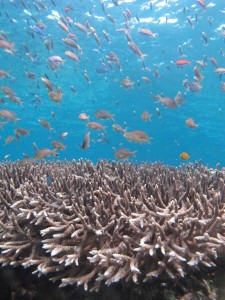NSU Newsroom
SharkBytes
Horizons
This version of NSU News has been archived as of February 28, 2019. To search through archived articles, visit nova.edu/search. To access the new version of NSU News, visit news.nova.edu.
This version of SharkBytes has been archived as of February 28, 2019. To search through archived articles, visit nova.edu/search. To access the new version of SharkBytes, visit sharkbytes.nova.edu.
New Research Shows Increasing Ocean Temperatures Affecting Coral Reefs
 FORT LAUDERDALE-DAVIE, Fla. – It seems that coral reefs are experiencing something their human counterparts have been for years – a shrinking “empty nest” syndrome.
FORT LAUDERDALE-DAVIE, Fla. – It seems that coral reefs are experiencing something their human counterparts have been for years – a shrinking “empty nest” syndrome.
That’s right – researchers have found that increasing ocean temperatures due to climate change will soon see reefs retaining and nurturing more of their own coral larvae, leaving large reef systems less interconnected.
The study brought together an international group of researchers from NSU’s Oceanographic Center; the Australian Research Council Centre of Excellence for Coral Reef Studies and the School of Marine and Tropical Biology at James Cook University in Australia; and Sesoko Station, Tropical Biosphere Research Center at the University of the Ryukyus, Japan.
“This research has potentially significant implications for understanding the future of coral reefs,” said Richard Dodge, Ph.D., dean of NSU’s Oceanographic Center. “It has benefited from the outstanding international collaborations the Oceanographic Center has with researchers at James Cook University (Australia) and the University of the Ryukyus in Japan.”
These findings have both positive and negative implications.
“We found that at higher temperatures more coral larvae will tend to stay on their birth reef,” says Joana Figueiredo, Ph.D., who is with NSU’s Oceanographic Center but was with the ARC Centre of Excellence for Coral Reef Studies (Coral CoE) at James Cook University when the study began. “This is good news in an otherwise cloudy picture for isolated reefs, because in the future they will be able to retain more of their own larvae and recover faster from severe storms or bleaching events.”
Figueiredo is the lead author of the study, entitled Increased Local Retention Of Reef Coral Larvae As A Result Of Ocean Warming, published today by Nature Climate Change.
Sean Connolly, Ph.D., also from the Centre of Excellence for Coral Reef Studies, explained that while more coral larvae will stay close to their parents, fewer will disperse longer distances, leaving reefs less connected.
“The loss of connectivity can make reef systems such as the Great Barrier Reef (in Australia) or the Florida Coral Reef Barrier more vulnerable,” he said. “So interconnected reef systems that depend on the recruitment of coral larvae may take more time to recover after a disturbance, such as a hurricane, because fewer larvae will disperse from other reefs to the disturbed reef.”
Connolly added that weaker connections between reefs means warm-adapted corals, such as those in the Caribbean, may take longer to expand their ranges to the north.
Similarly for isolated reefs, Saki Harii, Ph.D., from the University of the Ryukyus said: “While isolated reefs can retain more of their own larvae, this also leaves them with fewer possibilities to change their species composition to adjust to climate change.”
Andrew Baird, Ph.D., from the Centre of Excellence for Coral Reef Studies said the implications of the research present management with both challenges and opportunities.
“Our results demonstrate that global warming will change patterns of larval connectivity among reefs,” he said. “On a positive note, the stronger link between adults and recruits means an even greater benefit if we reduce local threats such as dredging and fishing methods that can damage corals,” Dr Baird says.
Nevertheless, he said: “This does not reduce the need for global action on climate change.”
The paper, Increased local retention of reef coral larvae as a result of ocean warming by Joana Figueiredo, Ph.D., Andrew H. Baird, Ph.D., Saki Harii Ph.D., and Sean R. Connolly, Ph.D., published today by Nature Climate Change and images are available on request.
CONTACTS
- Joana Figueiredo, Ph.D., Nova Southeastern University (Oceanographic Center), +1-954 262 3638, jfigueiredo@nova.edu
- Sean Connolly, Ph.D., James Cook University, +61-7 4781 4242, sean.connolly@jcu.edu.au
- Andrew Baird, Ph.D., James Cook University, +61-7 4781 4857, andrew.baird@jcu.edu.au
- Saki Harii, Ph.D., University of the Ryukyus, +81-980 47 6073, sharii@lab.u-ryukyu.ac.jp
- Melissa Lyne, media liaison, +61-4 1551 4328, melissa.lyne@gmail.com
###
About Nova Southeastern University: Situated on 314 beautiful acres in Fort Lauderdale, Florida, Nova Southeastern University (NSU) is a dynamic, fully accredited research institution dedicated to providing high-quality educational programs at all levels. NSU is a not-for-profit independent institution with an enrollment of 27,000 students. NSU awards associate’s, bachelor’s, master’s, specialist, doctoral and first-professional degrees in a wide range of fields. NSU is classified as a research university with “high research activity” by the Carnegie Foundation for the Advancement of Teaching, and it is one of only 37 universities nationwide to also be awarded Carnegie’s Community Engagement Classification. For more information, please visit www.nova.edu. Celebrating 50 years of academic excellence!
Media Contacts:
Joe Donzelli | Office of Public Affairs
954-262-2159 (office)
954-661-4571 (cell)
jdonzelli@nova.edu